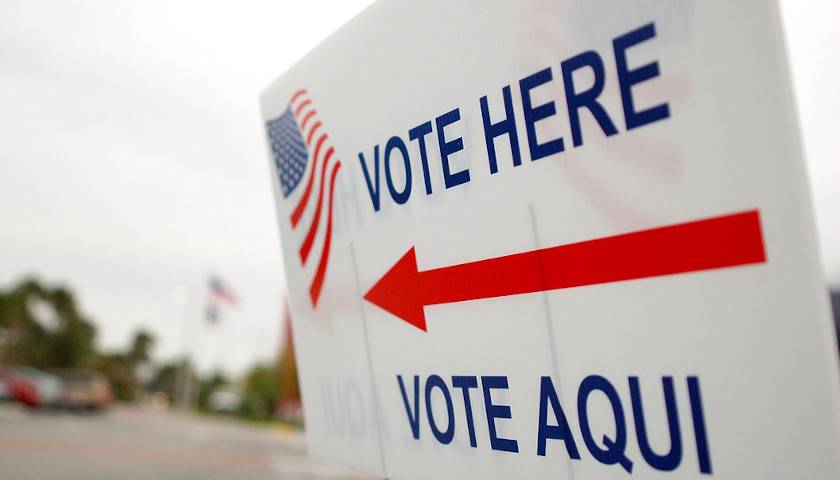by Natalia Mittelstadt
A California county has been sued by an election integrity watchdog over not making non-citizen voting records available while states are divided on whether non-citizens should be permitted to vote in U.S. elections.
Some states are allowing non-citizens to vote in local elections while others are prohibiting it. Alameda County in California is being sued for not producing voter registration and voting records of non-citizens.
The Public Interest Legal Foundation (PILF) filed a federal lawsuit on Monday against the Alameda County Registrar of Voters for allegedly violating the 1993 National Voter Registration Act (NVRA) by not disclosing records of foreign nationals registering to vote and voting for more than 20 years.
In September, PILF “requested all records showing the number of voter registration records canceled because the registrant did not satisfy the citizenship requirements for voter registration; and Records related to each cancellation including copies of each registrant’s voter registration application, voter registration record, voting history, and related correspondence sent or received by the Registrar’s Office.”
County officials told PILF that they did “not have access to the voter registration database,” but after the nonprofit informed them of being in violation of the NVRA, they said the records would be available in January. However, the county missed the deadline and didn’t make the records available.
“For more than four months, we have been trying to obtain records about foreign nationals getting on the voter roll,” PILF President J. Christian Adams said in a statement on Tuesday. “Alameda County’s lack of transparency and utter disrespect for federal law is particularly alarming as we enter a presidential election year. The public has a right to inspect election records, including these important records that reveal mistakes and errors by election officials.”
The Alameda County Registrar of Voters didn’t immediately respond to a request for comment on Wednesday.
While non-citizens are prohibited from voting in federal, state, and most local elections, three states and Washington, D.C., allow non-citizens to vote in local elections. The three states are California, Maryland, and Vermont. Meanwhile, seven states have specified that non-citizens aren’t allowed to vote in state and local elections: Alabama, Arizona,Colorado, Florida, Louisiana, North Dakota, and Ohio.
However, Arizona has bifurcated elections, in which residents who provide proof of U.S. citizenship can vote in all elections while the rest may vote only in federal elections, resulting in ballots cast by voters who haven’t proven their U.S. citizenship.
At least around 5,800 federal-only ballots were cast in the November 2020 presidential election in Arizona.
The Supreme Court ruled in 2013 that Arizona must accept U.S. voter registration forms because of federal requirements under the NVRA. Federal voter registration forms require those filling them out only to sign a sworn declaration that they are U.S. citizens.
According to a PILF report from last May, Chicago records show that 394 foreign nationals were removed from the city’s voter rolls since 2007, with 20 of them recorded as casting 85 ballots. In April 2023, PILF reported that Maricopa County, Ariz., records showed that since 2015, 222 foreign nationals were removed from the county’s voter rolls, with nine of them recorded as casting 12 ballots across four federal elections.
The Pennsylvania Department of State announced in September 2017 that records indicated 1,160 non-citizens had since 1972 requested their voter registrations be canceled. PILF is currently in a lawsuit against the commonwealth, as Pennsylvania hasn’t released the records of voter registration of foreign nationals despite the nonprofit’s request. The commonwealth appealed the district court’s ruling in favor of PILF, which is pending before the Court of Appeals for the Third Circuit.
In Georgia, an audit by Secretary of State Brad Raffensperger (R) found in 2022 that over 1,600 non-citizens tried to register to vote.
At the end of 2021, then-Texas Secretary of State John Scott (R) released the results of the first phase of his audit of the state’s voter rolls, which found that 11,737 potential non-U.S. citizens were identified as being registered to cast ballots, with many located in the counties around Texas’ two largest cities of Houston and Dallas.
In January 2022, PILF and North Carolina reached a settlement following a lawsuit by the election integrity watchdog for the state to release voting records from non-citizens. PILF also reached a settlement with Harris County, Texas, in 2020 to receive non-citizen voting records.
According to a 2018 PILF report, there were 3,120 non-citizen removals from various city and county voter rolls across the country in the prior decade.
Adams told the “Just the News, No Noise” TV show last year that the “vast majority” of non-citizens “are motor voter registrations” – referring to the 1993 National Voter Registration Act that made it easier for people applying for a driver’s license to also register to vote.
The second most-common way for non-citizens to get onto voter rolls is third-party registration drives by nonprofits, Adams said. He added that when non-citizens go to a Department of Motor Vehicles office, many of them “lie,” saying they are U.S. citizens, and “get registered” to vote.
“Some people, guys, say, ‘no,’ and they still get registered to vote,” Adams said. “I’ve just got stacks of voter registration forms. People will actually say, ‘no, I’m not a U.S. citizen.’ They still get on the voter rolls.”
PILF recommends that Congress prevent foreign nationals from voting by either “allowing states to validate citizenship effectively” or adding “citizenship to the National Voter Registration Act’s reasonable list maintenance requirements.”
Last month, the Honest Elections Project released a report with 14 recommended election reforms that states should adopt to ensure the integrity of their elections. One of these reforms is to “[b]an non-citizen voting in all elections.”
“American elections should be decided by American citizens, but a growing number of cities including New York City and Washington, D.C., are responding to liberal pressure and working to enfranchise non-citizens and illegal aliens,” the report reads.
The recommended reform reads, “Most state constitutions grant voting rights to ‘every’ citizen, open-ended language that liberal activists argue permits localities to authorize non-citizen and even illegal alien voting. States should amend their constitutions to instead permit ‘only’ citizens may vote.”
The concerns of non-citizen voting come as nearly 2.5 million illegal crossers were encountered by U.S. Customs and Border Protection agents at the southern border during fiscal year 2023, which broke the record of the previous year.
– – –
Natalia Mittelstadt graduated from Regent University with Bachelor of Arts degrees in Communication Studies and Government.
Photo “Vote Here” by Erik (HASH) Hersman CC2.0.



